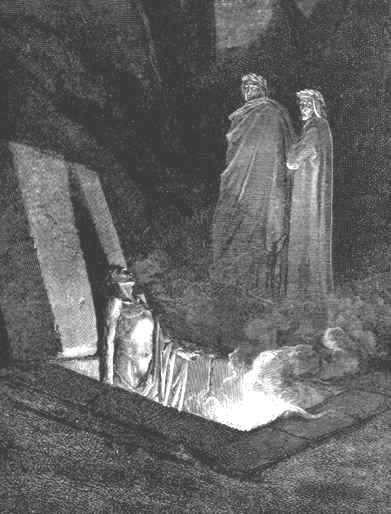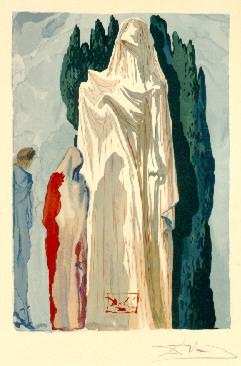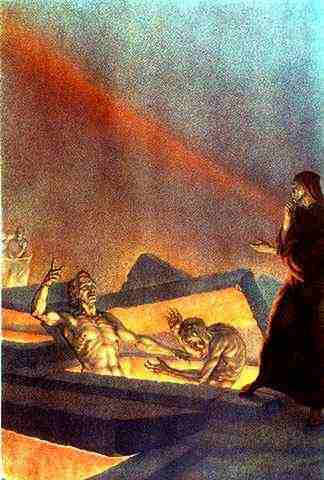 |
 |
 |
|
|
|
|
 |
 |
 |
|
|
|
|
| INF10 |
|
| ........... | ....... G.GUAITA |
................................. H.W.LONGFELLOW |
...... .D.ALIGHIERI |
....... ... | ....... |
| 1
|
Al
màrcia
pr'
an
santé
dès tant astrët che l'hà da chi al mür, da là i turmént al mè maèstru; e mi ia stag daré. |
Now
onward goes, along a narrow path Between the torments and the city wall, My Master, and I follow at his back. "O power supreme,
that through
these impious circles The people who
are lying
in these tombs, |
Ora
sen
va
per
un
secreto calle, tra 'l muro de la terra e li martìri, lo mio maestro, e io dopo le spalle. |
| 4
|
"O
ti
grand
om
che
a vëdi tam cumpàgni i post di pecatùr, mè che a ti 't piàs, làsa che 't ciàma lònche i völ savéj. |
«O
virtù
somma, che per li empi giri mi volvi», cominciai, «com'a te piace, parlami, e sodisfammi a' miei disiri. |
|
| 7
|
La
gént
che
iè
'nt
si tòmbi 's pöl cunòsii? I cuèrc' a ién ausà e a mi ma zmìa che 'nsün, chi 'nturn, a fè la guàrdia i sìa". |
La gente
che per
li sepolcri giace potrebbesi veder? già son levati tutt'i coperchi, e nessun guardia face». |
|
| 10
|
"Tüti
si
tòmbi
,
'm
dis, saràn sarà quànd i turnràn dla val ad Josafàt e ognadün cun al corp che l'ha lasà. |
And
he to me: "They all will be closed up When from Jehoshaphat they shall return Here with the bodies they have left above. Their cemetery
have upon
this side But in the
question thou
dost put to me, |
E quelli
a me: «Tutti
saran serrati quando di Iosafàt qui torneranno coi corpi che là sù hanno lasciati. |
| 13
|
A
ién
'nti
's
simitéri
sistemà , cun Epicùro, cùi che i crëdu fort che l'ànima la cèsa dop la mort. |
Suo
cimitero da questa
parte hanno con Epicuro tutti suoi seguaci, che l'anima col corpo morta fanno. |
|
| 16
|
Perciò
a
la
dumànda
che
t'è fami, t'avrè chi 'ndrénta sübit la rispòsta e ànche a lònche ti t'è nén ciamàmi". |
Però a la
dimanda che mi faci quinc'entro satisfatto sarà tosto, e al disio ancor che tu mi taci». |
|
| 19
|
"Car
maèstru,
se
mi
nén
tüt at dig l'è parchè iù pagüra ad distürbèti, par lònche ti t' è dìmi an mumént fa". |
And
I: "Good Leader, I but keep concealed From thee my heart, that I may speak the less, Nor only now hast thou thereto disposed me." "O Tuscan, thou
who through
the city of fire Thy mode of
speaking makes
thee manifest |
E io:
«Buon
duca, non tegno riposto a te mio cuor se non per dicer poco, e tu m'hai non pur mo a ciò disposto». |
| 22
|
"O
tuscàn
che
par
la
sità dal föc viv t'at nu vè parlànd cuzì sincér, fàmi la curtezìa ad chi farmèti; |
«O
Tosco che
per la città del foco vivo ten vai così parlando onesto, piacciati di restare in questo loco. |
|
| 25
|
da
mè
che
't
pàrli
iün al capìs ciàr che t'è nasì ànche ti 'nti cùla pàtria che mi cardénd 'd fè ben iù tratà mal". |
La tua
loquela ti
fa manifesto di quella nobil patria natio a la qual forse fui troppo molesto». |
|
| 28
|
Sa
vus
che
a
l'impruvìs
a l'è surtì 'dna tòmba lì davzìn, l'ha spuantàmi e andré, tacà al maèstru, iù 'rtiràmi. |
Upon
a sudden issued forth this sound From out one of the tombs; wherefore I pressed, Fearing, a little nearer to my Leader. And unto me he
said: "Turn
thee; what dost thou? I had already
fixed mine
eyes on his, |
Subitamente questo
suono uscìo d'una de l'arche; però m'accostai, temendo, un poco più al duca mio. |
| 31
|
Lü
'nvéce
'm
dis:
"Ma
gìrti, che ca 't fè? Vàrda là 'l Farinàta drisà 'n pé! Ti 't vëdi che 'l sort fòra cun al büst". |
Ed el mi
disse: «Volgiti!
Che fai? Vedi là Farinata che s'è dritto: da la cintola in sù tutto 'l vedrai». |
|
| 34
|
I'
àva
drit
anti
so
fisà i me öc' là cun la stòmi biùt e la front àuta, tla zmiava dì :"Par mi séj mechi pauta". |
Io avea
già
il mio viso nel suo fitto; ed el s'ergea col petto e con la fronte com'avesse l'inferno a gran dispitto. |
|
| 37
|
Al
mè
maèstru,
alùra,
cuj
so man, l'ha dàmi l'àndi e l'ha dit :"Atént , e vàrda bén mè 't pàrli, 'm racumànd". |
And
with courageous hands and prompt my Leader Thrust me between the sepulchres towards him, Exclaiming, "Let thy words explicit be." As soon as I was
at the foot
of his tomb I, who desirous
of obeying
was, |
E
l'animose man del
duca e pronte mi pinser tra le sepulture a lui, dicendo: «Le parole tue sien conte». |
| 40
|
Quànd
mi
iù
stàta
vzìn'a
a cùla tòmba lü l'ha vardàmi fis, da strafutént, pö 'm ciàma : " Mè l'è 'l nom dla to gént?" |
Com'io al
piè
de la sua tomba fui, guardommi un poco, e poi, quasi sdegnoso, mi dimandò: «Chi fuor li maggior tui?». |
|
| 43
|
E
mi
che
già
da
dìgliu iàva vòja, iù nén fàmi preghè, iù numinàii. Alùra l'ha ausà ancùra 'n poc la tèsta: |
Io ch'era
d'ubidir
disideroso, non gliel celai, ma tutto gliel'apersi; ond'ei levò le ciglia un poco in suso; |
|
| 46
|
"Ién
stàta
dür
-
am
dis - e sémp cuntràri a mi e ai mè e ànche al mè partì, ma dùi vòlti mi a iù disfài". |
Then
said he: "Fiercely adverse have they been To me, and to my fathers, and my party; So that two several times I scattered them." "If they were
banished, they
returned on all sides," Then there uprose
upon the
sight, uncovered |
poi disse:
«Fieramente
furo avversi a me e a miei primi e a mia parte, sì che per due fiate li dispersi». |
| 49
|
"Se
t'è
disfàji
-
mi
iù rispundìji - ién turnà 'ndréra l' üna e l'àuta vìra; anvéce i vos maj ién rivà a sa mìra". |
«S'ei
fur
cacciati,
ei
tornar
d'ogne parte», rispuos'io lui, «l'una e l'altra fiata; ma i vostri non appreser ben quell'arte». |
|
| 52
|
'Ntartànt
i
vëd
la
tèsta
sòrti fòra d' iün che spuntàva mèc fin la baséa; i péns che fòrse l'éra 'nginuiàsi. |
Allor surse a la
vista scoperchiata un'ombra, lungo questa, infino al mento: credo che s'era in ginocchie levata. |
|
| 55
|
'L
vardàva
'nturn
a
mi,
tam mè 'l vuléisa vëdi se ansèma a mi iéra quaidün; quànd l'ha capì che l'àva mèc sbagliàsi, |
Round
me he gazed, as if solicitude He had to see if some one else were with me, But after his suspicion was all spent, Weeping, he said
to me: "If
through this blind And I to him: "I
come not
of myself; |
Dintorno
mi guardò,
come talento avesse di veder s'altri era meco; e poi che 'l sospecciar fu tutto spento, |
| 58
|
pianzénd
am
dis
:"
Se
't vè par sa parzòn ch'ià mìa 'd lùce, par al to l'ingëgn, andùa l'è 'l mè fiö? parchè iè nén? |
piangendo
disse:
«Se per questo cieco carcere vai per altezza d'ingegno, mio figlio ov'è? e perché non è teco?». |
|
| 61
|
E
mi
a
lü
:"
Ma mi son nén chi sul; cul che m'aspèta là, an mén'a a iün che 'l Guìdo fòrse l'àva nén tant car". |
E io a
lui: «Da
me stesso non vegno: colui ch'attende là, per qui mi mena forse cui Guido vostro ebbe a disdegno». |
|
| 64
|
Dài
so
paròli
e
ànche
dla cundàna, iàva sübit capì chi l'éra lü; e ,mè i düvìva, a ton iù rispundìi. |
His
language and the mode of punishment Already unto me had read his name; On that account my answer was so full. Up starting
suddenly, he
cried out: "How When he became
aware of some
delay, |
Le sue
parole e 'l
modo de la pena m'avean di costui già letto il nome; però fu la risposta così piena. |
| 67
|
Ma
d'impruvìs,
ausàsi
'n
pé,
lü 'm dis: "T'è dit che l'àva? donc l'è pü nén viv? a ià pü nén ant' i öc' dal sul la lùce?". |
Di subito
drizzato
gridò: «Come? dicesti "elli ebbe"? non viv'elli ancora? non fiere li occhi suoi lo dolce lume?». |
|
| 70
|
Sicùme
'n
poc
a
iù
spità rispòndi, sübit as vëd, l'è fàsi la so idéa; l'è 'ndàta giü e pü nén l'è surtì fòra. |
Quando
s'accorse
d'alcuna dimora ch'io facea dinanzi a la risposta, supin ricadde e più non parve fora. |
|
| 73
|
Cul
àut
che
l'éra
fèrm
mè 'n munümént, la zmiàva nanc l'avéisa dat da mént, lì, imòbil, drit e sénsa fè na piéga. |
But
the other, magnanimous, at whose desire I had remained, did not his aspect change, Neither his neck he moved, nor bent his side. "And if,"
continuing his
first discourse, But fifty times
shall not
rekindled be |
Ma
quell'altro magnanimo,
a cui posta restato m'era, non mutò aspetto, né mosse collo, né piegò sua costa: |
| 76
|
"Continuànd
lònche
prìma
nuj
i
dizìvu che i mè i savéisu nén mè 's fa a turnè, am brüza tam 'mè 's föc, ànsi, püsè. |
e
sé continuando
al primo detto, «S'elli han quell'arte», disse, «male appresa, ciò mi tormenta più che questo letto. |
|
| 79
|
Ma
la
fàcia
dla
Déa,
chi regìn'a, sinquànta vòlti 'n prìma duvrà fèsi , pö 't pruvarè 'nche ti che ca 'l völ dì. |
Ma non
cinquanta
volte fia raccesa la faccia de la donna che qui regge, che tu saprai quanto quell'arte pesa. |
|
| 82
|
E
se
ti
't
turnarè,
mè i crëd, an tèra, parchè ién còntra, là , a tüti i mè e i chìtu pròpi maj da fèni guèra?". |
And
as thou wouldst to the sweet world return, Say why that people is so pitiless Against my race in each one of its laws?" Whence I to him:
"The slaughter
and great carnage After his head he
with a
sigh had shaken, |
E se tu mai nel
dolce mondo
regge, dimmi: perché quel popolo è sì empio incontr'a' miei in ciascuna sua legge?». |
| 85
|
"
'L
dizàstru
che
l'è
stàji an rìva a l'Arbia che rùsi i àqui 'd sang ién fìn'a 'vnì, an fa 'nti cézi adès preghè cuzì". |
Ond'io a
lui: «Lo
strazio e 'l grande scempio che fece l'Arbia colorata in rosso, tal orazion fa far nel nostro tempio». |
|
| 88
|
L'ha
supatà
la
tèsta
suspirànd
: "Ma iéra nén mèc mi, - l'ha rispundìmi - e iàvu, tüti 'nsèma, an giüst mutìv; |
Poi
ch'ebbe sospirando
il capo mosso, «A ciò non fu' io sol», disse, «né certo sanza cagion con li altri sarei mosso. |
|
| 91
|
ma
quànd
distrüi
Firénse
già
i vulìvu, che iàvu tüti i àuti vutà 'si', a upònmi còntra tüti iù stat mèc mi!". |
But
there I was alone, where every one Consented to the laying waste of Florence, He who defended her with open face." "Ah! so hereafter
may your
seed repose," It seems that you
can see,
if I hear rightly, |
Ma fu' io
solo, là
dove sofferto fu per ciascun di tòrre via Fiorenza, colui che la difesi a viso aperto». |
| 94
|
"
Che
'n
dì
pöda
avéj pas la vòsa sménsa, ma 'v preg che i àbji a bén spieghèmi 'n dübi che i son nén bon , da mi , da vnìni fòra. |
«Deh, se riposi
mai vostra semenza», prega' io lui, «solvetemi quel nodo che qui ha 'nviluppata mia sentenza. |
|
| 97
|
Se
iù
capì
m'
azmìa
che i prevëdi , , al témp luntàn, che ancùra al dév avnì; par al prezént, 'v cumpòrti nén cuzì". |
El par
che voi veggiate,
se ben odo, dinanzi quel che 'l tempo seco adduce, e nel presente tenete altro modo». |
|
| 100
|
"
Nuj
ia
vdùma,
mè
cuj 'd nén bòn'a vìsta, i ròbi da luntàn; mèc cust i sùma: la nòsa cunusénsa finìs chi. |
"We
see, like those who have imperfect sight, The things," he said, "that distant are from us; So much still shines on us the Sovereign Ruler. When they draw
near, or are,
is wholly vain Hence thou canst
understand,
that wholly dead |
«Noi veggiam,
come quei c'ha mala luce, le cose», disse, «che ne son lontano; cotanto ancor ne splende il sommo duce. |
| 103
|
Quànd
che
s'
avzìn'u
o
'ntal mumént che i son, ad vëdi niénte i sùma pü nén bon; e niénte i sùma ad lònche iè 'ntal mond. |
Quando
s'appressano
o son, tutto è vano nostro intelletto; e s'altri non ci apporta, nulla sapem di vostro stato umano. |
|
| 106
|
E
quàd
pö
la
fin
dal témp sarà rivà pü niénte cunusrà la nòsa mént, sarà a la scüri 'd tüt cumpletamént". |
Però comprender
puoi che tutta morta fia nostra conoscenza da quel punto che del futuro fia chiusa la porta». |
|
| 109
|
Alùra
iù
capì
che
iéra
'n cùlpa ; " Dizìji - i dis - al pàri , che i vëd pü, che 'l fiö l'è 'ncùra viv e la sta bén; |
Then
I, as if compunctious for my fault, Said: "Now, then, you will tell that fallen one, That still his son is with the living joined. And if just now,
in answering,
I was dumb, And now my Master
was recalling
me, |
Allor,
come di mia
colpa compunto, dissi: «Or direte dunque a quel caduto che 'l suo nato è co'vivi ancor congiunto; |
| 112
|
e
se
a
lü
sübit
nén iù rispundü', a l'è parchè mi, prìma, i sàva nén lònche vuj dès a iéi spiegàmi bén". |
e s'i'
fui, dianzi,
a la risposta muto, fate i saper che 'l fei perché pensava già ne l'error che m'avete soluto». |
|
| 115
|
Pö
'l
maèstru
l'ha
fàmi
sëgn ch' i andéisa; e mi a la spìrit iù ciamà pü 'n prèsa che i so cumpàgn ad pén'a 'm numinéisa. |
E
già 'l maestro
mio mi richiamava; per ch'i' pregai lo spirto più avaccio che mi dicesse chi con lu' istava. |
|
| 118
|
"
Tra
i
mìla
e
mìla ch' ién cun mi chi 'ndrén, iè 'l Federìc secònd e 'l Cardinàl; mèc cùsti 't dig, ad i àuti mi i parl nén". |
He
said: "With more than a thousand here I lie; Within here is the second Frederick, And the Cardinal, and of the rest I speak not." Thereon he hid
himself; and
I towards He moved along;
and afterward
thus going, |
Dissemi:
«Qui
con più di mille giaccio: qua dentro è 'l secondo Federico, e 'l Cardinale; e de li altri mi taccio». |
| 121
|
Lü
l'è
'ndà
giü
,
mi i turn tacà 'l puéta, e 'ntla mént i pensàva a cul parlè che niénte 'd bon am dàva da sperè. |
Indi
s'ascose; e io
inver' l'antico poeta volsi i passi, ripensando a quel parlar che mi parea nemico. |
|
| 124
|
Lü
l'è
'nviaràsi
,
e
ntant ch' i andàvu , am fa: "Parchè t'è muc cuzì e t'è i öc' fis?" e mi a lü lònche 'm santìva i dis. |
Elli si
mosse; e
poi, così andando, mi disse: «Perché se' tu sì smarrito?». E io li sodisfeci al suo dimando. |
|
| 127
|
"
Cul
che
iàn
dìti
còntra, ténlu a mént, - cuzì am racumànda al mè maèstru - e dès sta bén atént - e l'ha ausà 'l di - |
"Let
memory preserve what thou hast heard Against thyself," that Sage commanded me, "And now attend here;" and he raised his finger. "When thou shalt
be before
the radiance sweet Unto the left
hand then he
turned his feet; |
«La
mente tua
conservi quel ch'udito hai contra te», mi comandò quel saggio. «E ora attendi qui», e drizzò 'l dito: |
| 130
|
quànd
ti
't
sarè
guidà
da cùla dòna dài bèj öc' sant , da lé che tüt la sa, 't savrè la vìta tùa 'mè sarà". |
«quando sarai
dinanzi al dolce raggio di quella il cui bell'occhio tutto vede, da lei saprai di tua vita il viaggio». |
|
| 133
|
Pö
'l
gìra
a
snìstra
e 'l mür 's lu làsa
'ndré; i andùma vèrs al mès di na spianà, par an santé che 'l rìva fin na val |
Appresso mosse
a man sinistra il piede: lasciammo il muro e gimmo inver' lo mezzo per un sentier ch'a una valle fiede, |
|
| 136 | d'andùa i ven n'udùr che 'l fa rvuchè. | Which even up there unpleasant made its stench. | che 'nfin là sù facea spiacer suo lezzo. |